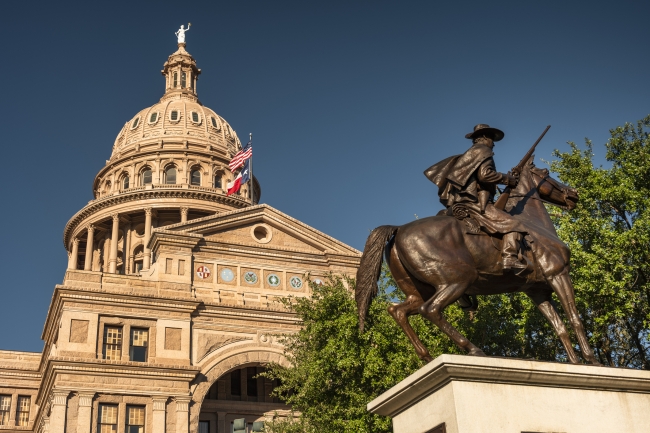You have /5 articles left.
Sign up for a free account or log in.
Texas bills that would affect tenure and ban an expansive definition of diversity, equity and inclusion programs and policies at public institutions are on the brink of passage.
But they are also running out of time.
The legislature adjourns Monday, and any bills not passed to the governor by then die—unless resurrected later in a special legislative session.
This past Monday, the Texas House of Representatives passed an amended version of Senate Bill 17, the anti-DEI legislation, back to the Senate in an 83-to-62 vote. The noes were all Democrats, according to The Texas Tribune’s Elected Officials Directory.
The next day, by about the same margin and almost the same breakdown, the House passed back to the Senate a much-amended version of Senate Bill 18. The Senate’s version would’ve ended tenure in public colleges and universities going forward, while the House version alters but preserves it.
But as of Wednesday afternoon, the Senate hadn’t decided whether to accept the House’s changes to either bill. If the Senate rejects the changes, back-and-forth negotiations between the chambers will have to take place to save the bills before the session’s end.
Republicans lead both chambers, but it’s unclear what versions of bills they will agree on—or if they will agree at all. Dan Patrick, Texas’s lieutenant governor, touted the Senate’s versions of the bills, but the House drastically altered at least SB 18, the tenure bill.
The Houston Chronicle earlier reported that there’s a Republican divide on SB 17, the anti-DEI bill.
Jill Glover, chair of the State Republican Executive Committee’s Legislative Priorities Committee, criticized the House’s changes on the state Republican Party’s website Monday.
“Sen. Brandon Creighton, a champion for conservatives this session, authored a bill that effectively dismantles diversity, equity and inclusion departments in Texas universities,” Glover wrote. “The House undid much of this work with an amendment that includes a study requiring all students be asked about their sexual orientation and gender identity. This is reprehensible, as it furthers the myth that a young person can be something other than his or her biological sex. Additionally, an amendment added to the bill prohibits the college or university from firing any DEI employee. So while DEI ‘offices’ would be banned, every DEI employee would be guaranteed a position in other departments where they will continue propagating this harmful ideology.”
Glover wrote, “if the bill cannot be restored to it’s [sic] original goal in conference, it is preferable for the bill author, Senator Creighton, to kill his own bill rather than pass the substituted bill.”
Neither Glover nor Creighton responded to Inside Higher Ed’s requests for comment Wednesday.
Regarding the study amendment, Glover appeared to be referring to a House change to require, as the bill now says, “an annual study to identify the impact … on the recruitment rate, acceptance rate, matriculation rate, retention rate, grade point average and graduation rate of students at institutions of higher education, disaggregated by race, sex, color, ethnicity, gender identity or sexual orientation.”
The House made another change that doesn’t, as Glover said, prohibit “firing any DEI employee.” The change says public colleges and universities “shall make reasonable efforts so that each employee of the institution whose position would otherwise be eliminated [by the bill] … is offered reassignment to a position of similar pay at the institution” (emphasis added).
The House version of the bill still bans a wide variety of so-called DEI programming, including “conducting trainings, programs or activities designed or implemented in reference to race, sex, color, ethnicity, gender identity or sexual orientation, other than trainings, programs or activities developed by an attorney and approved in writing by the institution’s general counsel and the Texas Higher Education Coordinating Board for the sole purpose of ensuring compliance with any applicable court order or state or federal law.”
It also bans “influencing hiring or employment practices at the institution with respect to race, sex, color or ethnicity, other than through the use of color-blind and sex-neutral hiring processes in accordance with any applicable state and federal antidiscrimination laws.”
The NAACP Legal Defense Fund, alongside the Texas Conference of the American Association of University Professors and several other groups, signed a statement objecting to SB 17.
“This legislation threatens to eliminate critical tools still needed to advance educational equity and will negatively impact student outcomes, such as retention and graduation rates for Black students, Latinx students and students from other underrepresented communities,” the statement says.
Antonio Ingram, assistant counsel at the NAACP Legal Defense Fund, said, “There were a number of legislators from the Black Caucus and the Mexican Caucus who just talked about how racist this bill was.”
Ingram also reiterated that Texas is now a majority-minority state.
“To have a bill like this now, that is seeking to hamstring the ways in which this integration can be fully realized, I think just shows the racial undertones of this law that many people have called discriminatory,” he said.
As for SB 18, Brian Evans, president of the AAUP’s University of Texas at Austin chapter and vice president of the AAUP’s broader Texas Conference, notes the House version still allows for tenured professors to be fired for undefined—at least in the bill—infractions.
“I mean this is, like, wide-open, you know—what does this mean?” said Evans, who said he was speaking as an individual. “We have policies on all kinds of things, so where would it be that I would get fired over it?”
“This is just so far away from national standards adopted by AAUP, in conjunction with university presidents and governing boards, well-established principles, that this is going to hurt our competitiveness in recruiting and retaining tenured and tenure-track faculty,” he said.
But, he said, if some version of SB 18 must pass, he urged lawmakers to pass the House version, which doesn’t completely get rid of tenure going forward.
“This would be a total unraveling, destruction, of our higher ed systems,” he said.
The University of Texas and Texas A&M systems declined comment.





